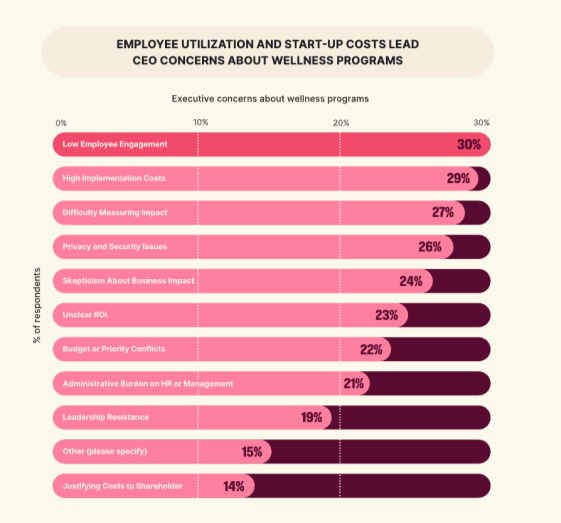Beyond Budget: Wellhub Report Reveals Employee Engagement is CEOs' #1 Wellness Program Concern
Last Updated Jun 12, 2025

Most CEOs—78%—already see wellness as a strategic investment, recognizing its power to boost engagement, retention, and long-term business success
NEW YORK, June 18, 2025 – A new in-depth study from Wellhub, the global corporate wellness platform, unveils a surprising truth about executive priorities when it comes to workplace wellness: CEOs are most concerned with employee engagement and utilization, not program costs.
The "Return on Wellbeing 2025 Report," based on insights from over 1,500 international CEOs and business leaders, underscores that while cost is a factor, the primary hurdle for leaders is ensuring employees actually use the wellness benefits provided.

"Our research clearly shows that CEOs aren't hesitant about the financial commitment to wellness; they're driven by the desire to see real, tangible impact through employee participation," said Cesar Carvalho, CEO and Co-Founder of Wellhub. "We've seen it firsthand: wellbeing isn't just a benefit, it's a strategic driver for heightened productivity, stronger talent retention, and a leaner bottom line through reduced healthcare costs. It's crucial for us to recognize that while we may have unique access to resources and the flexibility to prioritize our health, many employees do not. Providing accessible, impactful wellbeing programs for all employees isn't just a moral imperative; it's a strategic investment that yields profound returns across the entire organization."
Key Findings Redefine How Leaders View Wellness:
- Wellbeing is a Strategic Investment, Not a Perk: 82% of CEOs globally report positive returns from their wellness programs, directly linking them to increased productivity (56%), reduced absenteeism (67%), and stronger employee retention (73%) and reduced healthcare costs (68%). This data underscores that wellness is a critical business asset, not a discretionary expense.
- The Executive-Employee Wellbeing Divide: A Call for Accessible Wellness: The study reveals a significant "perception gap": while 93% of CEOs report excellent or good overall wellbeing, only 63% of employees say the same. CEOs who actively participate in wellness programs are twice as likely to increase funding, demonstrating that their personal experience with wellbeing motivates investment. This highlights the opportunity for leaders to extend the benefits they personally experience—like access to therapy, time for exercise, and mindful practices—to their entire workforce, bridging this crucial gap in experience and access.
- Flexible Work Reality: CEOs tell us flexible work is here to stay—58% say greater schedule flexibility would improve their own wellbeing, and 45% believe promoting flexible work models is key to successful wellness initiatives. This shift requires wellness programs offering virtual, on-demand, and multi-location options to effectively serve today's dispersed workforce.
Actionable Roadmap for HR Leaders to Drive Investment: The report provides clear strategies for HR leaders to successfully increase wellness funding:
- Frequent Impact Reporting: CEOs who received regular (at least monthly) updates on wellness program performance were significantly more likely (58%) to increase funding.
- Framing Wellness as a Business Asset: Successfully connecting wellness to core business objectives like productivity, cost reduction, and retention is crucial for securing buy-in.
- Piloting Programs: Starting with smaller, data-driven pilot programs can provide the measurable results needed to secure larger investments.
- Leadership Engagement: Encouraging active participation from executives creates internal champions and boosts overall program adoption.
- Addressing Concerns with Data: Proactively addressing CEO concerns about engagement, ROI, and budget with hard data turns skepticism into support.
“CEOs who personally experience the benefits become the most powerful advocates for company-wide wellbeing,” said Carvalho. “This creates a virtuous cycle where leadership wellness drives investment, which improves employee wellness, which ultimately strengthens business performance. The most successful CEOs understand that wellness advocacy must start in the C-suite—not just with budget allocation, but with authentic personal engagement. When leaders visibly prioritize their own wellbeing, it transforms from corporate policy into cultural permission."
The full report is available at wellhub.com/en-us/resources/research/return-on-wellbeing-2025
Methodology
Wellhub surveyed 1,500 CEOs, Presidents, and Managing Partners/Directors across 10 countries to understand their motivations for investing in corporate wellness. The survey was conducted online via QuestionPro between January 24 and February 7, 2025, targeting leaders of companies with 100+ employees. It included 67 questions using Likert scales, multiple and multi-choice formats, and open-ended responses. Responses were collected evenly across the United States, United Kingdom, Brazil, Argentina, Chile, Romania, Spain, Italy, Germany, and Mexico (150–151 per country). The results have a 95% confidence level and a 5% margin of error.
About Wellhub
Wellhub is a corporate wellness platform that connects employees to the best partners for fitness, mindfulness, therapy, nutrition, and sleep, all included in one subscription designed to cost less than each individual partner. More than 23,000 companies in 13 countries use Wellhub to give their millions of employees access to best-in-class corporate wellbeing programs that are proven to drive widespread employee adoption and engagement. With Wellhub, employees can check-in with their wellbeing every day. The result is better productivity, higher retention, and lower healthcare costs. This is the Wellhub Effect. Become a wellness company today.
Category
Share

The Wellhub Newsroom shares the all of the latest company and wellbeing industry news. Discover what's happening. Are you a journalist? Contact us at press@wellhub.com.
Subscribe
Our weekly newsletter is your source of education and inspiration to help you create a corporate wellness program that actually matters.
Subscribe
Our weekly newsletter is your source of education and inspiration to help you create a corporate wellness program that actually matters.